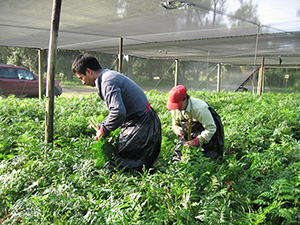Partnerships for Environmental Public Health (PEPH)
Academic Partners:
University of Washington
Catherine Karr, M.D., Ph.D.
Community Partners:
Yakima Valley Farm Workers Clinic
Northwest Community Education Center and KDNA 91.9 FM

Project Description
A community-academic partnership called Proyecto Bienstar — The Well Being Project — sought to learn more about ambient outdoor triggers of asthma in farm workers, such as ammonia and particulate air pollution. This research is leading to strategies to control, eliminate, or avoid exposure to asthma triggers. Proyecto Bienstar is a collaboration of researchers at the University of Washington, Yakima Valley Farm Workers Clinic, the Northwest Community Education Center and its affiliate KDNA radio, and Heritage University.
Asthma, a major public health problem with increasing incidence, is among the leading chronic diseases of children in the United States. There has been limited asthma research in rural populations, and farm workers' children in particular. Because morbidity by asthma is disproportionately high in farm workers' children, public health advocates are interested in expanding asthma research to include ambient outdoor triggers.
Rather than focus on rural-urban differences in asthma prevalence, the project identified environmental factors, such as pesticides, agricultural dusts, and pollen that trigger asthma in rural, farm-working populations. The research team used innovative sampling technologies, cell phones for regular patient contact, and GIS technology to collect information to empower patients, clinical providers, local health jurisdictions, and the public to create strategies to control, eliminate, or avoid exposures to asthma triggers.
The project partners:
- Studied 58 school-age children with asthma who lived in an agricultural community of Yakima Valley. Following these children for two months revealed that increases in particulate matter less than 2.5 microns in diameter was associated with an increase in reported asthma symptoms in this agricultural setting.
- Found preliminary evidence that children living near dairy operations in rural Washington State are exposed to elevated levels of ammonia that likely comes from animal feeding operations. For children with asthma, exposure to elevated ammonia or any of the numerous ammonia co-pollutants may be associated with lung function decrements in the following days.
- Developed a study that augments home-based asthma and environment education with placement of portable high efficiency particulate air (HEPA) cleaners in the homes of children with asthma.
- Engaged the Yakima Valley Farm Workers Clinic and the Northwest Community Education Center/Radio KDNA to help with participant recruitment and engagement as well as exposure and health assessments.
- Worked with University of Washington scientists to characterize key indoor pollutant exposures and asthma health outcomes for the study using both traditional metrics and emerging biomarkers.
A multifaceted evaluation is assessing the process, outcomes, and impact of the program on the partnership, the participants, the clinical providers, and the community.
Selected Publications:
- Loftus C, Yost M, Sampson P, Arias G, Torres E, Vasquez VB, Bhatti P, Karr C. 2015. Regional PM2.5 and asthma morbidity in an agricultural community: a panel study. Environ Res 136:505-512. [Abstract Loftus C, Yost M, Sampson P, Arias G, Torres E, Vasquez VB, Bhatti P, Karr C. 2015. Regional PM2.5 and asthma morbidity in an agricultural community: a panel study. Environ Res 136:505-512.]
- Loftus C, Yost M, Sampson P, Torres E, Arias G, Breckwich Vasquez V, Hartin K, Armstrong J, Tchong-French M, Vedal S, Bhatti P, Karr C. 2015. Ambient ammonia exposures in an agricultural community and pediatric asthma morbidity. Epidemiology 26(6):794-801. [Abstract Loftus C, Yost M, Sampson P, Torres E, Arias G, Breckwich Vasquez V, Hartin K, Armstrong J, Tchong-French M, Vedal S, Bhatti P, Karr C. 2015. Ambient ammonia exposures in an agricultural community and pediatric asthma morbidity. Epidemiology 26(6):794-801.]
- Armstrong JL, Fitzpatrick CF, Loftus CT, Yost MG, Tchong-French M, Karr CJ. 2013. Development of a unique multi-contaminant air sampling device for a childhood asthma cohort in an agricultural environment. Environ Sci Process Impacts 15(9):1760-1767. [Abstract Armstrong JL, Fitzpatrick CF, Loftus CT, Yost MG, Tchong-French M, Karr CJ. 2013. Development of a unique multi-contaminant air sampling device for a childhood asthma cohort in an agricultural environment. Environ Sci Process Impacts 15(9):1760-1767.]
- Hofmann JN, Crowe J, Postma J, Ybarra V, Keifer MC. 2009. Perceptions of environmental and occupational health hazards among agricultural workers in Washington State. AAOHN J 57(9):359-371. [Abstract Hofmann JN, Crowe J, Postma J, Ybarra V, Keifer MC. 2009. Perceptions of environmental and occupational health hazards among agricultural workers in Washington State. AAOHN J 57(9):359-371.]


